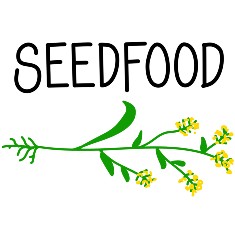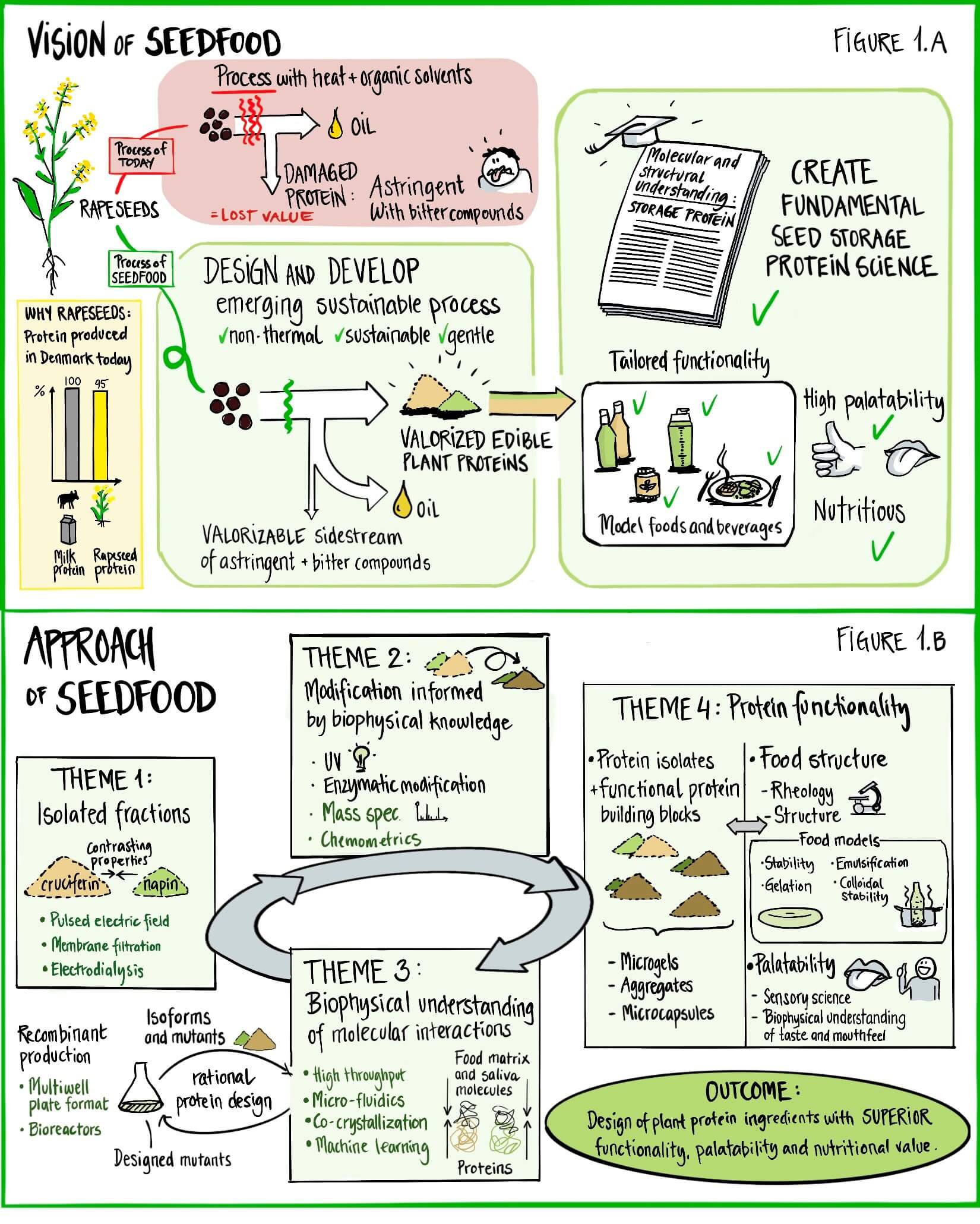SEEDFOOD: Functional and palatable plant seed storage proteins for sustainable foods
Our vision is to accelerate the transition from animal- to plant-based food proteins for sustainable food production and consumption in a world with a fast increasing population.

Rapeseed is farmed on large scale in Europe. Today rapeseed cakes containing the proteins are used for animal feed.
If the global production of rapeseed cakes is transformed to valuable protein isolates and used as food ingredients it can cover the protein requirements for 700 million human beings.
The project will:
-
establish new processes to remove antinutrients and improve the palatability (neutral flavour) of rapeseed protein
-
create food-grade protein modifications leading to the desired functionality and palatability
-
give molecular insight of interactions among plant proteins and other molecules in food matrices which will be used for tailoring the required functionality
 Funded by:
Funded by:

Co-PI: Poul Erik Jensen
Most of the rapeseed grown in Europe is used for industrial oil production and animal feed. The SEEDFOOD project aims to change this by creating new fundamental knowledge, so the proteins instead can be applied in new food types for human consumption.
The transition from animal- to plant-based food proteins needs to be accelerated in order to support sustainable food production and consumption in a world where the population continues to increase fast. Crude plant protein concentrates are challenged by high levels of antinutrients, poor palatability (bitterness and astringency), inadequate functionalities for complex food systems and hence insufficient quality for food usage.
SEEDFOOD aims to tailor plant seed protein with highly functional, palatable, and nutritional properties through novel protein design and in-depth understanding of molecular interactions in the food matrix. Protein functionality and protein modification are in focus along with novel processing technology, biophysics and machine learning.
The research activities are divided into four separate, but closely interconnected, themes.
The vision and approach of SEEDFOOD is described in the figures below.

Our aim in Theme 1 is to generate native napin and cruciferin isolates with reduced levels of unpalatable and antinutritional compounds and control of mineral content. This will be achieved using emerging gentle technologies and knowledge of molecular properties. We intend to avoid industrial processes that require the use of high levels of water and energy and damage the rapeseed proteins. The technologies considered for isolation, purification and non-thermal enzyme inactivation are membrane filtration, pulsed electric field and electrodialysis.
Theme leader: Professor Marianne Nissen Lund, UCPH FOOD
The aim of Theme 2 is to understand how specific modifications induced by food-acceptable approaches affect rapeseed protein structures, and physical properties like solubility, unfolding, surface charge, and isoelectric points in order to improve functionality and palatability. Modifications on rapeseed proteins will be induced by enzymes and UV-light. The resulting protein material will be comprehensively characterized on the molecular level and effects on protein functionality and palatability will be evaluated in collaboration with Theme 4. Recombinant rape protein mutants produced in Theme 3 will be used for mechanistic studies.
Theme leader: Professor Marianne Nissen Lund, UCPH FOOD
In Theme 3 we will use purified rapeseed proteins (napin and cruciferin) as well as recombinant rapeseed protein isoforms and mutants for mechanistic studies on protein biophysical properties with the aim to understand structure, stability, solubility and molecular interactions. The material will be comprehensively biophysically characterized. We moreover aim to investigate the interaction between rapeseed proteins and biomolecules from saliva and food matrices, which will enable us to design protein functionalities and improved palatability relevant for application in food.
Theme leader: Professor Alexander K. Büll, DTU Bioengineering
The aim in Theme 4 is to develop functional protein building blocks (aggregates, microgels, microcapsules) using insights on rapeseed protein modifications and interactions. We will also focus on understanding how native and modified rapeseed protein isolates create desired food structures (gels, emulsions, protein-rich solutions with high colloidal stability), and improve palatability by understanding how native and modified rapeseed proteins contribute to bitterness and astringency in the mouth through interaction with saliva.
Theme leader: Professor Taco Nicolai, University of Le Mans
University of Copenhagen, Denmark
- Department of Food Science (UCPH FOOD)
Technical University of Denmark (DTU)
-
Department of Biotechnology and Biomedicine (DTU Bioengineering)
-
The Novo Nordisk Foundation Center for Biosustainability (DTU Biosustain)
-
Department of Chemistry (DTU Chemistry)
University of Le Mans, France (ULM)
- Institut des Molécules et Matériaux du Mans
The principal investigator (PI) of SEEDFOOD is Professor Marianne Nissen Lund, Department of Food Science, University of Copenhagen (UCPH FOOD). She is also in charge of Theme 1: Gentle and sustainable isolation of rapeseed proteins and Theme 2: Tailored modification of rapeseed proteins to control their functional and palatable properties, and she is supported by 2 co-PI’s:
Professor Alexander Büll, Department of Bioengineering at the Technical University of Denmark (DTU-Bioengineering). Alexander Büll is heading Theme 3: Biophysical and structural understanding of both natural and recombinant rapeseed proteins and variants.
Professor Taco Nicolai, University of Le Mans, France, who is in charge of Theme 4: Functional and palatable properties of modified rapeseed proteins to create new rapeseed structures.
Theme 1 researchers
Theme leader, Professor Professor Marianne Nissen Lund, UCPH FOOD
PhD student, Lisa A. Gotzmann, UCPH FOOD
PhD student, Peter Fog Lihme, UCPH FOOD
Theme 2 researchers
Theme leader and PI of SEEDFOOD, Marianne Nissen Lund, UCPH FOOD
Professor Poul Erik Jensen, UCPH FOOD
Adjunct Professor Jacob Holm Nielsen, UCPH FOOD
Associate Professor Åsmund Rinnan, UCPH FOOD
Assistant Professor Mahesha M. Poojary, UCPH FOOD
Assistant Professor Kasper Engholm-Keller, UCPH FOOD
PhD student Shivani Karalia, UCPH FOOD
Theme 3 researchers
Theme leader, Professor Alexander Büll, DTU Bioengineering
Professor Poul Erik Jensen, UCPH FOOD
Professor Birte Svensson, DTU Bioengineering
Professor J. Preben Morth, DTU Bioengineering
Professor Morten O. A. Sommer, DTU Biosustain
Professor Günther H.J. Peters, DTU Chemistry
Assistant Professor Marie S. Møller, DTU Bioengineering
Team Coordinator Leonie J. Jahn, DTU Biosustain
Postdoc Shuang-Yan Wang, DTU Bioengineering
PhD student Casper Robert Balten van der Luijt, UCPH FOOD / DTU Biosustain
PhD student Lars K.S, Boyens-Thiele, DTU Bioengineering
Theme 4 researchers
Theme leader, Professor Taco Nicolai, ULM
Professor, Wender Bredie, UCPH FOOD
Postdoc, Ching Yue Chow, UCPH FOOD
PhD student, Aina Belén Gil González, UCPH FOOD
PhD student Colleen Mudeau, Le Mans Université
PhD student Maria Moutkane, Le Mans Université
Postdoc, Gireesh Balakrishnan, Le Mans Université
Postdoc in Chemometrics with focus on food protein modifications
Application deadline: 1 November

